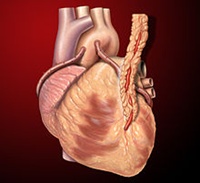Depression and heart disease - a deadly mix
03 Mar 2014
Heart patients suffering from depression do not respond as well to treatment as patients without deporession, a new study led by the Yale School of Public Health finds.
 Approximately 20 per cent of those hospitalised for a cardiovascular event are diagnosed with depression and even more show signs of depression but are not clinically diagnosed. An estimated 15.4 million U.S. adults have coronary heart disease.
Approximately 20 per cent of those hospitalised for a cardiovascular event are diagnosed with depression and even more show signs of depression but are not clinically diagnosed. An estimated 15.4 million U.S. adults have coronary heart disease.
An American Heart Association Scientific Statement led by Judith Lichtman systematically reviewed 53 studies relevant to the association of depression and acute coronary syndrome.
They found that that despite differences in published studies in the field, there is a consistent message that depression is associated with adverse outcomes, including death and non-fatal cardiac events such as heart attack and angina for heart patients.
The AHA Statement calls for depression to be considered a risk factor for poor outcomes among people with acute coronary syndrome. The paper appears in the journal Circulation.
''There is growing recognition among cardiologists that psycho-social factors are associated with outcomes,'' said Lichtman, associate professor at the Yale School of Public Health.
''The goal of this Scientific Statement was to carefully review studies to evaluate the evidence linking the risk of depression on outcomes for patients with cardiovascular disease, as well as to identify standards for future research and identify areas of new inquiry.
Physiologically, depression is hypothesised to disrupt the neuroendocrine system and automatic cardio control, platelet activity and endothelial function and it may play a role in inflammation. Depression may also be a factor in high-risk behaviors such as smoking, sedentary lifestyle, postponing treatment and non-adherence to prevention measures. Furthermore, depression may exacerbate physical inactivity and poor self-care.
''Depression is a really important issue for those with heart conditions,'' said Lichtman. ''There needs to be routine screening for depression, and we cannot underestimate its role in the recovery process.''
The authors recommend future research on the sub-types and characteristics of depression most associated with increased risk for heart patients, the best means of screening and coordinating care for patients with depression, and identifying safe and effective treatments for depression after acute coronary syndrome.
Eleven co-authors from universities around the country contributed to the study, including Erica Leifheit-Limson of the Yale School of Public Health.


















